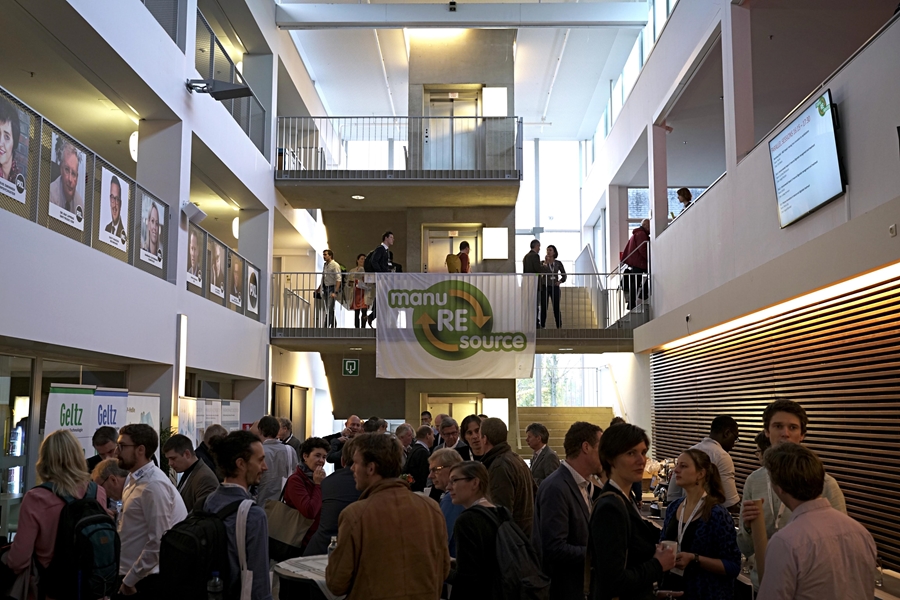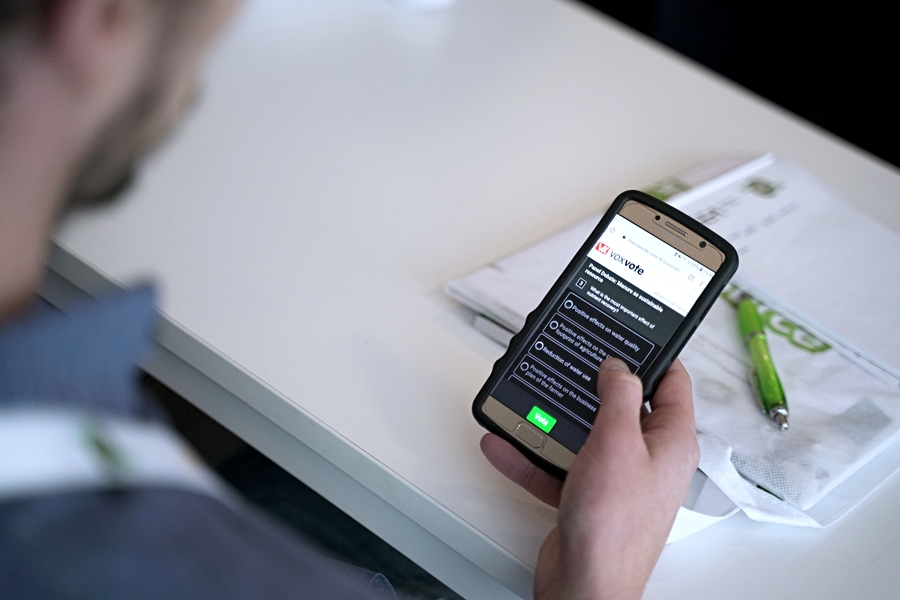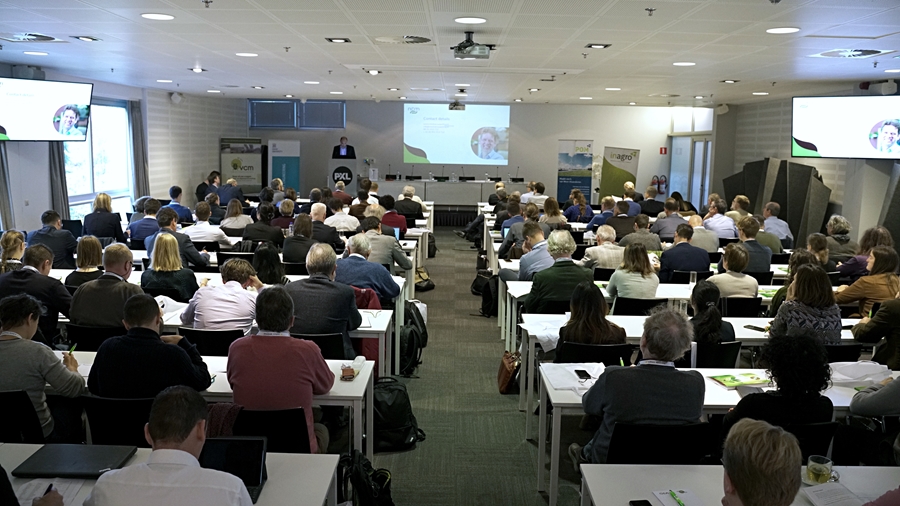- Home
-
Manure processing
-
Manure processing in Flanders
- State of affairs
- Techniques and end products
- Ivan Tolpe Prijs - Manure Processing Innovation Award
- Transition in manure processing
- Publications
- ManuResource conference
-
Manure processing in Flanders
- ManuResource
- Projects
- News
- Organisation
- Contact
More than 200 attendees from 18 countries!
From 27 to 28 November 2019, more than 200 participants involved in the manure processing sector gathered at Hasselt in Belgium to discuss the importance of manure management and valorisation at the European level during ManuRESource 2019. ManuREsource is an international conference organized by the Flemisch Coordination Centre for Manure Processing (VCM vzw), Ghent University, Inagro en POM West-Flanders. The fourth edition of ManuREsource was organised in collaboration with NCM, the Dutch Centre of Expertise for Manure Valorization. The purpose of this conference? To demonstrate the importance of nutrient recovery from manure and the transition to a circular, bio-based economy and identifying solutions hampering this transition.

First public presentation of SAFEMANURE results
During the opening session of ManuREsource 2019, Wim Debeuckelaere, European Commission (EC) DG Environment presented for the very first time the key findings of the JRC SAFERMANURE study proposing criteria for the safe use of processed manure in Nitrates Vulnerable Zones above the threshold established by the Nitrates Directive. A new term for Recovered Nitrogen from Manure, RENURE, was introduced. This could be considered as a first step towards end-of-manure status for processed/upcycled manure. The proposed criteria for the use of processed manure products were highlighted in the context of European Nitrate Directive. These results indicate large potential for scrubbing salts and mineral concentrates as biobased fertilisers.
On the second day of ManuREsource 2019, An Derden, representative of the Flemish research institute VITO explained the methodology in updating the BAT document for manure processing in Flanders with techniques for nutrient recovery. Theodora Nikolapoulou, EC DG Grow gave an overview of the 2019 Fertiliser product regulation and the overlaps with other regulations on animal by-products and regulations applying to the use of animal manure (Nitrates Directive). Henning Lyngso Foged, Organe, Denmark presented the best practices and technologies for nutrient recovery and circular economy in the Baltic Sea Region.
A Panel discussion, with representatives of the agriculture department of Lombardy Region (IT), Research (WUR, NL), manure processing installations (Fertikal and La Ferme du Faascht, BE), mineral fertilizer industry (YARA) and fruit and vegetable retail (GroentenFruitHuis, NL) in the panel, took place with a poll interaction. The audience was given the opportunity to give their own opinion and ideas on topics as the ideal scale of nutrient recovery, the importance of farm-level pretreatment of manure, the higher costs of nutrient recovery, lesssons to be learnt from the wastewater treatment sector, the regional scale of nutrient cycles and the importance of end-user demands. Similar topics were also discussed in more detail during round table discussions in smaller groups. It was concluded that nutrient recovery can reduce the input of nutrients in the agricultural nutrient cycle and that the importance of the addition of organic matter to the soil by using animal manure, in order to preserve the soil quality, should not be underestimated. Furthermore, the involvement of the farmers is crucial to keep the transition towards a circular manure processing going.

Ivan Tolpe Award 2021
Flash presentations by sponsors from Nijhuis/GEA, Tema Process, Geltz, VP-Hobe, Elsinga, Colsen, Water Fund Investments Group, highlighted the latest technologies and processes in nutrient recovery.
Parallel workshops covered R&D impact addressing the transition from innovation to capitalisation and topics such as (1) product innovations for manure and digestate, (2) process innovations in manure and digestate treatment, (3) environmental impact assessment of manure and digestate and (4) the impact of agrofood concerns on the transition. The sessions provided opportunities to researchers from different institutions and stakeholders in the manure industry and government agencies to share their latest results in the above mentioned topics. In addition there was a workshop on the Ivan Tolpe Prijs, an award for innovative manure processing handed out every two years by the Flemish Coordination Centre for Manure processing (VCM vzw). In this parallel session, innovative techniques in manure processing were presented by Ivan Tolpe Prijs nominees from previous editions. Also a call for the Ivan Tolpe Prijs 2021 was launched. In 2020, new proposals of innovative techniques contributing to a sustainable and cost-efficient manure processing are welcome to be submitted before Friday October 23th 2020.
A historical visit to Jenever Museum took the participants down memory lane in the traditional brewing of jenever, a gin flavoured with juniper berries and also an example of a ‘circular economy’ practice in the olden days. According to a historical narrative, the waste from jenever processing was fed to oxen and the manure from the oxen was in turn used as an organic fertilizer to cultivate barley/wheat. The participants got the chance to taste locally brewed jenever. The first day ended with a dinner that allowed networking among all participants.
Towards the closing of the event, there were pitches by three nominees for the best poster award. After a poll by the audience, the poster treating “The effect of separation and thermal pre-treatment on process stability of pig manure mono-digestion” won the Best Poster Award 2019.
Driven by a broad range of discussions from researchers, policy makers, industry representatives and many stakeholders that rely on scientific research and results, the conference provided suggestions in order to quicken the transition to circular economy from a manure valorisation perspective. It was concluded that a holistic approach, taking into account the three P’s of sustainability (People, Planet and Profit) and collaborations between different players (farmers, biogas industry, chemical fertilizer companies, agro-food industry, end-product users) are vital.

Visit to two innovative manure processing installations
On the last day of the conference, two innovative manure treatment installations were visited, Arbio bvba (Arendonk, BE) and Biogas Bree (Bree, BE).

Mailing ManuREsource 2019
Subscribe for the ManuREsource 2019 mailing here!












